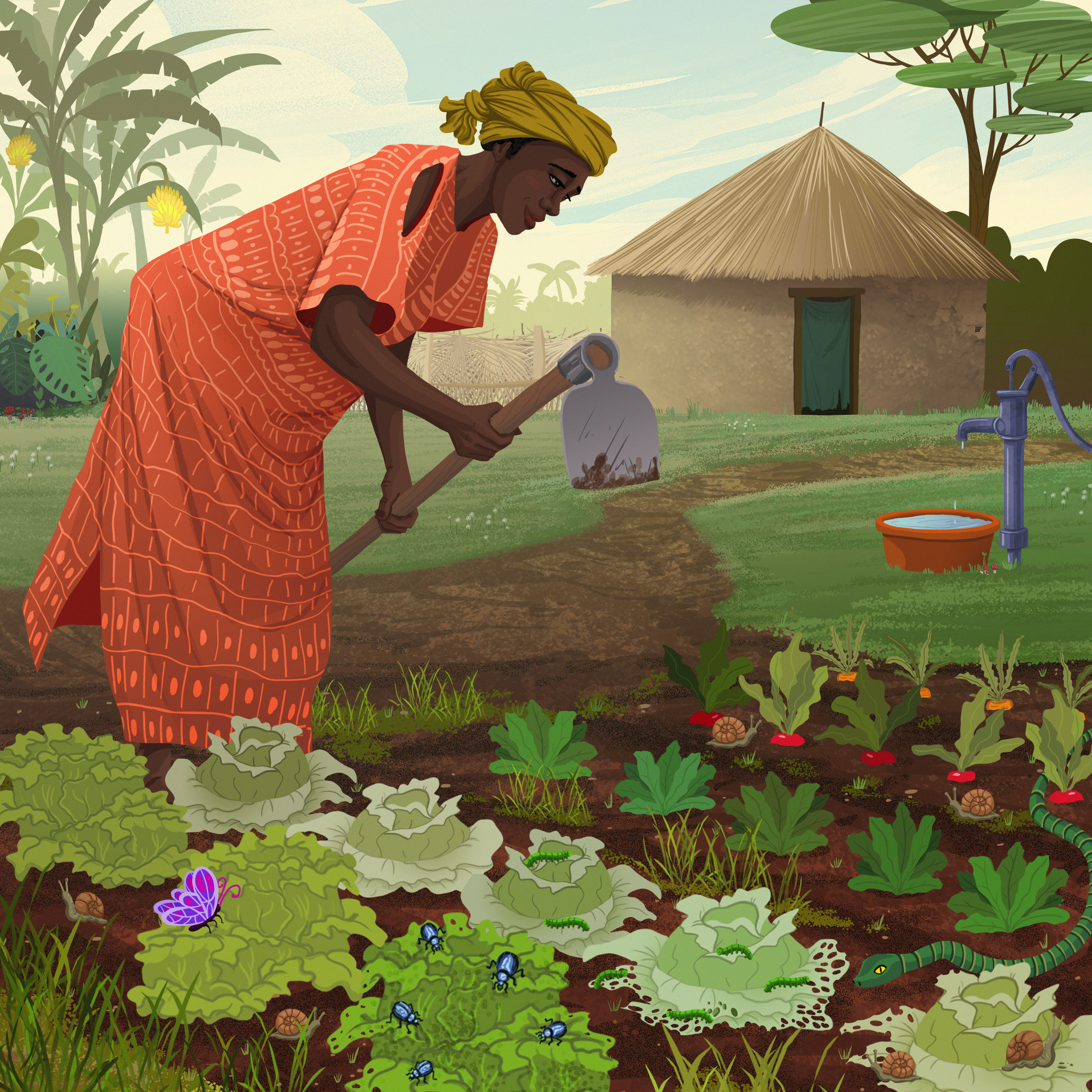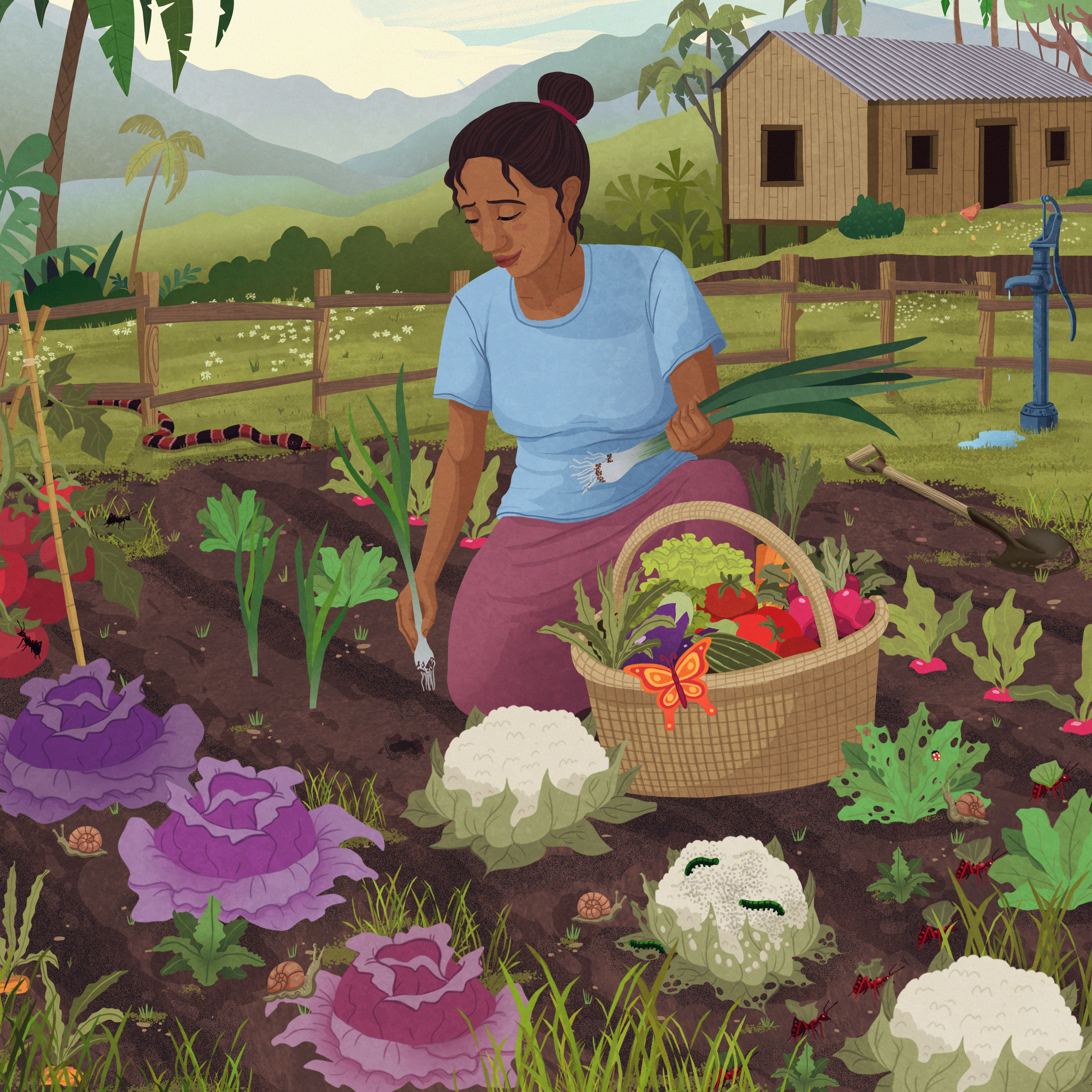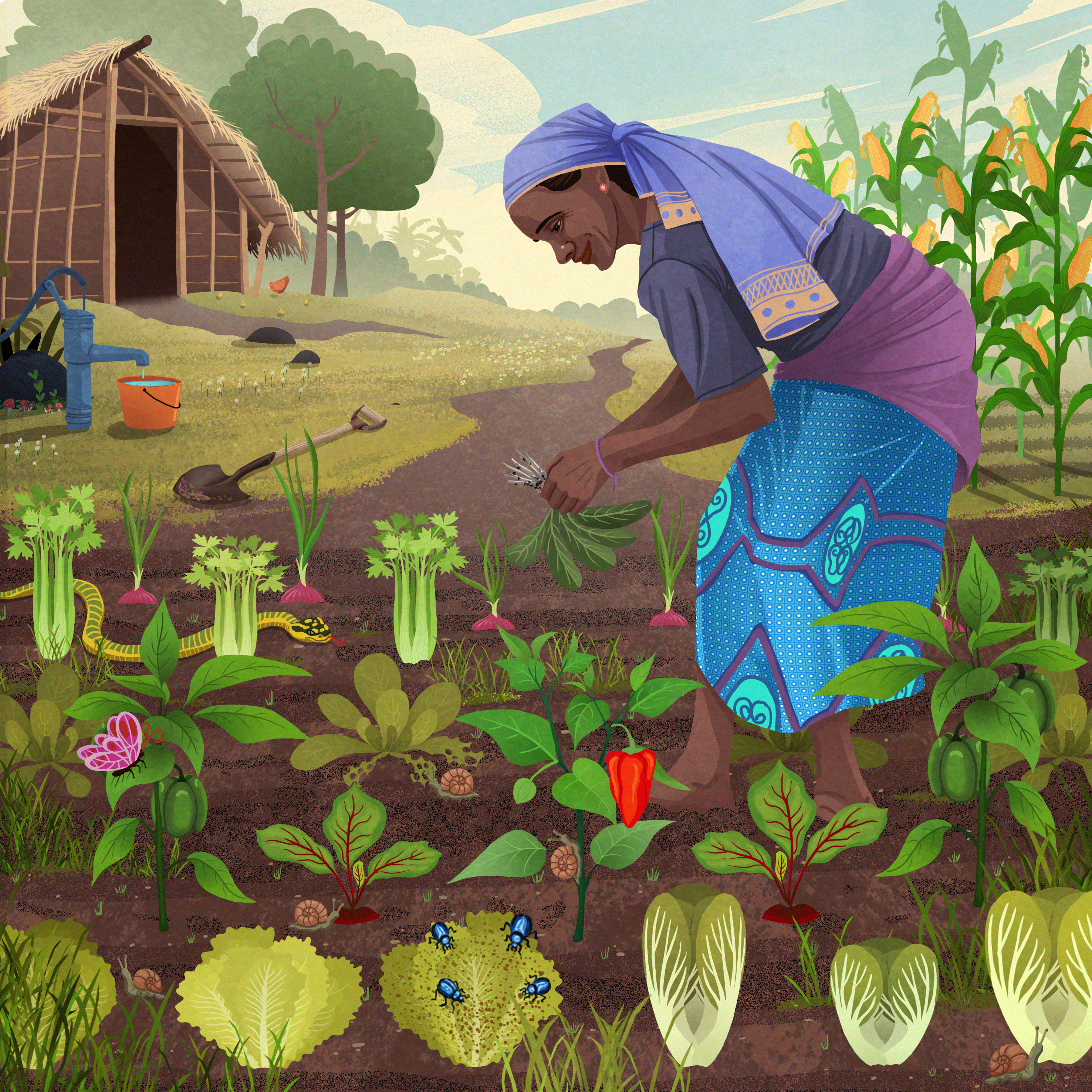Global Child Protection Parenting Curriculum
Year 1, Lesson 1: A Beautiful Garden
Time Needed: 55 minutes
Garden Images:



Index
Teacher Preparation
Introduction
New Ideas
Bible Story
Caregiver Connection
Reflection
Closing
Teacher Preparation
Objectives
The caretakers will be able to:
- Explore how parenting is like gardening.
- Hear a Bible story about how in the second creation account, God lovingly designs the world to care for humanity's heart, mind and body.
- Explore the parts of a plant and compare them to the parts of a person: heart, mind and body.
- Define unconditional parental love for children: to choose what is good for the whole person: heart, mind and body.
- Explain how God's unconditional love leads parents to protect their children because of their precious worth.
- Define child protection as the effort to protect children from all forms of harm, both intentional and unintentional.
Materials
- Chalkboard and chalk
- Plants or flowers picked nearby, or pictures of plants and flowers
Preparation
- Read the lesson and reflect on how to teach it wisely
- Skim previous lesson. Prepare to have a quick review at the beginning of class.
- Pick enough weeds or flowers for each group of 4 participants to have one. If that is not possible, simply draw a common flower or weed on paper, one per group.
- Look at the diagram of the person in the New Ideas section. Before class, practice drawing it and explaining the parts of a person.
Introduction
5 minutes
![]()
Welcome the parents to this time that you will share together. If the parents do not know one another and the group is small enough, ask them to introduce themselves and share their children's names and ages. Or have them introduce themselves to one person they do not know.
This is our first of twenty-four meetings where we will explore parenting together.
- To begin, let's think about an experience that is common to most of us. How many of you have grown flowers, plants or a fruit and vegetable garden? What do you grow? Allow participants to raise their hands and share common plants grown in the community.
Let's consider what we already know about growing a garden.
- What things do we usually do to care for a garden? Accept all answers. Some possible answers are: water it; protect it from pests; weed the garden; fertilize; etc.
- Why do we do these things for a garden? Accept all answers. Some possible answers are: to protect the plants; the garden needs additional care to be healthy; because we want to eat its fruit; etc.
We know that proper care enables plants to grow well and then bless us with good fruits and vegetables. An attractive garden also brings beauty for us to appreciate. Parenting our children is similar to caring for a garden. When we give our children what they need to grow well and give them protection and safety, like a garden they will grow healthy and bless others around them.
- Why is parenting often more difficult than caring for a garden? Accept all answers. Encourage parents to share some of the difficulties of raising children. Some possible answers are: it takes more work and effort; children do not always obey us; sometimes we lack patience; care for children is more expensive, etc.
Until our children are adults, we must put time and resources into them and we often find it tiring and stressful. However, this is not how God intended parenting to be. We know that loving and caring for our children is important, but how do we do this well? What does it look like to care for our children and treasure them, just as we value the good things that grow in a garden?
New Ideas
20 minutes
![]()
To help us explore how to love our children so that they flourish like a garden, get into groups of 4 people.
Each group will need one plant or flower. Give each group a real plant or picture of one. Encourage each group to examine their plant and then respond to the following questions as a group. Write the questions on the board (if available) and repeat them as needed for participants who may not read well.
- What are the parts of your plant? Describe what you can see, but also what you can’t see. If they need help, point out that there are parts inside the plant, such as water or other nutrients.
- Why are plants so valuable? Accept all reasons.
- How might you care for both the outside of a plant and the inside that you cannot see? Encourage them to think about how different gardening tasks help plants grow.
- What are the parts of a child? Describe what you can see, but also what you can’t see. The first question will be quite easy, as they can see a child’s body. For the second question, encourage them to think about feelings, personality, etc.
- Why are children so valuable? Accept all reasons.
- Choose one part of a child that you can see and one part that you cannot see. How might you care for each of these parts? How might you protect each of these parts?
Give the groups some minutes to discuss the questions and then have each hold up their plant and share their answers to the above questions. As they share, take notes on either a chalkboard or on a piece of paper for your reference.
We can see that, like plants, children have a visible body with needs. We care for our children’s bodies through feeding them and teaching them good hygiene. Repeat other examples that the groups shared.
Caring for the unseen parts of them is more difficult, but we can encourage them and listen to them. Repeat other examples that the groups shared.
There are many ways we might describe the parts of a child (repeat some of the group ideas). Draw the picture below on the board as you talk about the parts of the person – body, mind and heart.
![]()
In this class, we will view a child as having a body (which is easily seen), and a heart and a mind (which dwell within them and we cannot see). The mind describes a child’s thoughts and feelings, and the heart describes the will, which is what we use to make choices and decisions. Like the plants in our story, when we care for all these parts well, a child grows and thrives.
You all explained why a child is so valuable (repeat reasons shared in the group discussions). This value we place on children should lead us to love them unconditionally. What do you think it means to love a child unconditionally? Accept all answers. We love them no matter what, we continue to provide for them, etc.
In this parenting course, we will define unconditional love for children as choosing what is good for their heart, mind, and body. This means that our love for our children asks that we not only care for their physical needs, but also their inner, equally important parts to help them grow and mature.
Bible Story
15 minutes
![]()
Our goal as parents is to grow in our capacity to love our children unconditionally, but it is not always easy to know what unconditional love really looks like. We may have grown up in a home where our caregivers did not model unconditional love. Perhaps our caregivers took good care of our bodies but neglected or even harmed our minds or hearts. How can we know how to love our children unconditionally, if we did not receive unconditional love ourselves?
The good news is that no matter what our story is, we can all learn to receive and give love. God created us to receive his unconditional love and give that to others, including our children. Today we will hear the story of God creating the world. The story of how God created the world is crucial to understand, because it gives us a clear picture of how God intends us to live in a world where unconditional love is the foundation for everything.
As I read from Genesis, ask yourself this question: how is God’s unconditional love for us revealed in the way he creates the world? Listen for how God chooses good for humanity’s body, mind and heart.
Genesis 2:4-9; 15-23
4 Here is the story of the heavens and the earth when they were created. The Lord God made the earth and the heavens.
5 At that time, bushes had not yet appeared on the earth. Plants had not started to grow. The Lord God had not sent rain on the earth. And there was no one to farm the land. 6 But streams came from the earth. They watered the entire surface of the ground. 7 Then the Lord God formed a man. He made him out of the dust of the ground. God breathed the breath of life into him. And the man became a living person.
8 The Lord God had planted a garden in the east in Eden. He put in the garden the man he had formed. 9 The Lord God made every kind of tree grow out of the ground. The trees were pleasing to look at. Their fruit was good to eat. There were two trees in the middle of the garden. One of them had fruit that let people live forever. The other had fruit that let people tell the difference between good and evil.
15 The Lord God put the man in the Garden of Eden. He put him there to farm its land and take care of it. 16 The Lord God gave the man a command. He said, “You may eat fruit from any tree in the garden. 17 But you must not eat the fruit from the tree of the knowledge of good and evil. If you do, you will certainly die.”
18 The Lord God said, “It is not good for the man to be alone. I will make a helper who is just right for him.”
19 The Lord God had formed all the wild animals and all the birds in the sky. He had made all of them out of the ground. He brought them to the man to see what names he would give them. And the name the man gave each living creature became its name. 20 So the man gave names to all the livestock, all the birds in the sky, and all the wild animals.
21 So the Lord God caused him to fall into a deep sleep. While the man was sleeping, the Lord God took out one of the man’s ribs. Then the Lord God closed the opening in the man’s side. 22 Then the Lord God made a woman. He made her from the rib he had taken out of the man. And the Lord God brought her to the man.
23 The man said,
“Her bones have come from my bones.
Her body has come from my body.
She will be named ‘woman,’
because she was taken out of a man.”
- How is God’s love for us revealed in the way he created the world? Accept all answers.
The way God creates the world reveals to us his unconditional love for us. By his very design, he is choosing what is good for our body, mind and heart.
Point to the diagram of the whole person on the board. Consider how God’s creation of the world specifically addresses how he chooses good for our body, mind and heart.
- How do we see his provision for the healthy development of our body? Accept all answers. Possible answers: provides good fruit to eat.
- How do we see his provision for the healthy development of our mind (thoughts and feelings) through the work he gives Adam to do? Accept all answers. Possible answers: Gives purpose; to care for the earth and farm it, to name the animals.
- How do we see his provision for the healthy development of our heart (the place where we make choices)? Accept all answers. Possible answers: names animals, the choice to obey him and not eat from the tree of the knowledge of good and evil.
Caregiver Connection
5 minutes
![]()
The creation story reveals that God desires what is good for our body, mind and heart. As we learn to receive God’s love for us, we begin to desire and choose what is good for ourselves and others. As caregivers to children, it is wonderful to know that we can ask God to pour his love into us so that we can give his love out to our children, helping them to grow into healthy, strong adults who are able to make wise and loving choices.
Think about your own parenting or your own childhood.
- What do you think helps a child grow and mature in a positive way? Allow the parents a moment to think and encourage them to consider either positive growth experiences in their lives, or what they think would have helped them. Accept all answers, but they might say encouragement, support, basic needs met, or love and caring.
Love is what helps a child grow into a mature, wise adult. We all long for a love that meets all our needs, and children are the same. Learning to love our children like this is a lifelong process. One of the core ways that we love our children is through parenting them well. Another important way we love our children is by protecting them.
It is important to talk about child protection because we live in a world where the forces of evil are at work against the forces of unconditional love. Evil, in contrast to love, chooses what is bad for our heart, mind and body. In this parenting course, we will define child protection as protecting children from all forms of evil, both intentional (deliberate forms of harm) and unintentional (accidental forms of harm). In a world like ours, protection is a crucial part of a parent’s job.
Reflection
5 minutes
![]()
Parents have a significant task in raising a family. Many of us likely work hard and live with extended family and children in a small home. Such a busy life can make it difficult to find time and space to think about parenting and reflect on its challenges. Research shows, however, that one of the most important things we can do to grow and change is to simply make time to quiet ourselves and think about our lives!
Christians have always taught the importance of silent reflection before God. We call this time prayer. Prayer is a conversation with God – talking to him and listening for his response. As in any real conversation, it is important to quiet our hearts and minds, so that we can truly share with God those things we most desire him to know. Then we listen for his response of love to us.
During the time that we meet together, we will always have a short moment of silent reflection to give you the opportunity to have a conversation with God.
To begin, I will remind you of the key ideas that we discussed today:
- As parents, to love our children unconditionally means to choose what is good for their whole person: heart, mind, and body.
- Unconditional love leads us to protect our children because of their precious worth.
- Child protection is when we seek to protect children from all forms of harm, both intentional and unintentional.
Invite God to come sit down with you as you take a few minutes of quiet to answer these questions. Remember that you are talking to God and he is listening to you with understanding and love.
- What part of unconditionally loving your children do you find easy? What part do you find difficult? Allow a minute for silent reflection.
- How would you most like to protect your children? Why? Allow a minute for silent reflection.
Remember, prayer is a conversation. We talk to God, and we listen for God’s response to us. He desires to bring us encouragement, guidance and strength. Take a moment to ask God this question and listen for his response: How do you want me to grow in my understanding of how to unconditionally love my children? Allow a minute for silent reflection.
Closing
5 minutes
![]()
During the time that we take this parenting course together, we hope to grow to trust one another so that we can discuss our common parenting struggles. However, the point of today’s lesson was to begin with describing good parenting.
- What surprised you most in our description of good parenting? Accept all answers.
- What are some ways that you would like to protect your children? Accept all answers.
Encourage parents in the week ahead to pay attention to all parts of their children: their bodies, minds, and hearts. You will begin the next class sharing what they noticed.
![]()